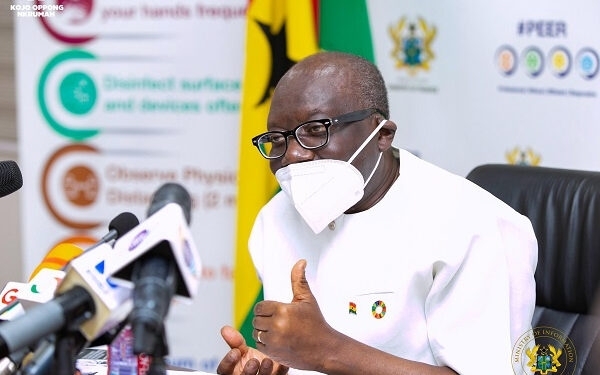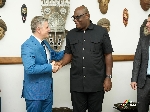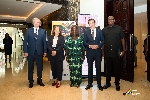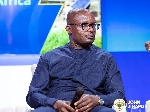IMF deal: Bring your ideas but 'we must be careful to build not tear down our nation' – Ofori-Atta to Ghanaians
 Mr Ofori-Atta said Ghana needs a viable domestic financial system to support its development programme
Mr Ofori-Atta said Ghana needs a viable domestic financial system to support its development programme
The government of Ghana has formed a 5-member committee consisting of prominent financial services professionals to “lead extensive stakeholder engagements across all the key segments of the financial sector – i.e. banking, asset, management, pensions, and insurance” as it engages the International Monetary Fund (IMF) for a $3 billion programme to save the economy.
The announcement of the committee members will be made in the coming days and they will “immediately get to work to engage key stakeholders in the financial services sector”, announced Finance Minister Ken Ofori-Atta at a press briefing on Wednesday, 28 September 2022 in Accra, indicating that it was an addition “to ongoing engagements with civil society organisations (CSOs), social partners (labour unions, employers, and FBOs), academia, industry professionals, and the leadership of parliament”.
“We welcome all contributions to this great public debate, but we must be careful to build and not to tear down our nation”, the minister said.
He said Ghana needs a viable domestic financial system to support its development programme, especially in these three years with limited access to the international capital market.
“Therefore, everything must, and will be done, to protect our financial sector; and there must be room for a win-win conversation through extensive stakeholder engagement with both our domestic and external investors”, noting: “Ghana has always had a collaborative approach with its partners and we shall, I am confident, come out with an ‘historic arrangement’”.
Mr Ofori-Atta said this is “a government that protected the savings of 4.6 million Ghanaian depositors with the reform of the banking and financial sector even in our early days”, adding: “We owe it to the economy and Ghanaians to keep protecting it”.
He said the “sanctity and the well-functioning of the financial system are sacrosanct and we need the support and trust of all Ghanaians to deliver this. Let us join hands to get this done. The great Celtic Miracle in Ireland in the 1980s was the result of such collaborations, especially with Labour and we shall also be blessed with the Ghana Miracle”.
The minister said the formal negotiations for a Fund-supported programme began on Monday, 26 September 2022 and discussions are “advancing smoothly”.
The IMF team, according to the minister, will cover a period of 10 days, and in line with the President’s dialogue with IMF Managing Director Kristalina Georgieva, “negotiations will be fast-tracked to ensure that key aspects of the programme are reflected in the 2023 Annual Budget Statement in November 2022”.
The government, he said, “is committed to ensuring that a comprehensive package is negotiated with the aim of restoring and sustaining macroeconomic stability, ensuring durable and inclusive growth and promoting social protection”.
“As stated in our press release dated 26th September 2022 on the commencement of the IMF negotiations, having a sustainable debt path is a pre-requisite for the IMF programme. Therefore, the IMF/World Bank and the Ghana Team are currently undertaking a debt sustainability analysis (DSA) to inform the programme negotiations”, he added.
In addition, the minister said “the IMF and Government Team are working to update the medium-term macro-fiscal framework to inform IMF programme design. Also, the Government Team and the IMF Team are discussing policy measures and structural reforms proposed in our economic programme aimed at addressing the economic challenges facing the country towards restoring and sustaining macroeconomic stability, fiscal and debt sustainability, as well as promoting durable and inclusive growth and social protection”.
Read the finance minister’s full briefing below:
1. Good Morning, and welcome to the 4th Press Briefing on the Economy this year. This is a buildup of our engagements on 20th January, 24th March and 12th May. These bi-monthly engagements have complemented the statutory update we provided on the Economy when we presented the 2022 Mid-Year Budget Review to Parliament on 25th July 2022.
2. Since 2020, our economy has seen considerable economic uncertainty. The priority for Government since the COVID-19 episode and the Russia-Ukraine war has been to address macro stability and welfare challenges that confronted the economy. Yet we have seen an inflation spiral and significant depreciation of our domestic currency that has affected many families and businesses. Globally, this development is now being described as the worst global cost of living crisis in 50 years.
3. Specifically, inflation remains high at 33.9% (August 2022), and the cedi has depreciated by 37.1% against the US Dollar as of 27th September 2022.
4. Indeed, during the 2022 Mid-Year Budget Review, I highlighted that our present situation was a painful one to report on. We haven’t seen anything like this since August 2001 when the inflation rate hit 33.9%.
5. Ladies & Gentlemen, we are at an important moment in our economic history; and in the context of today’s briefing, it is important to focus on the progress being made to put us firmly on a path of macroeconomic stability.
6. We have since Q1-2022 cut discretionary expenditures in our budget by 30%. In addition, we announced a number of expenditure measures to keep public spending in line with our tightening economic conditions including restraints on the purchase of new vehicles and a moratorium on non-statutory travel.
7. As part of measures to shore up our reserves, improve exchange rate stability and address some of the funding needs, the Ministry successfully worked on a US$750 million Afreximbank loan facility which was received in August 2022. The traditional Cocoa Syndication Loan, expected in the last quarter of 2022 which will promote the cocoa sector, will further help us build our FX reserves and provide a strong buffer for the cedi in the last quarter of the year.
8. Additionally, the Bank of Ghana has introduced enhanced measures such as a Special Foreign exchange auction for bulk distribution companies and a Gold Purchase Programme to contain the depreciation of the cedi, which is now slowing down.
9. So far, provisional fiscal developments for Jan-July 2022, presented within the context of the 2022 Budget revised deficit target of 6.6% of GDP and a primary balance of 0.4% of GDP show that: i. The overall fiscal deficit amounted to GH¢31.1 billion (5.3% of GDP), against a target of GH¢31.2 billion (5.3% of GDP); and ii. The corresponding primary balance for the period was a deficit of GH¢7.6 billion (1.3% of GDP), against a deficit target of GH¢7.8 billion (1.3% of GDP);
10. Current year expenditure has also largely been contained owing to the operationalisation of expenditure cuts announced since March. We are on course with expenditure rationalisation efforts and will continue to enforce strict adherence to these measures across all MDAs while ensuring efficient delivery of public services.
11. The Ghana Revenue Authority has intensified its efforts to shore up domestic revenue mobilization, particularly in relation to the enforcement of compliance measures. The increased visibility of GRA officials at shopping malls and various commercial establishments and at our borders across the country is in pursuit of meeting our revenue objectives.
12. Such exercises form part of an ongoing drive to ensure we take significant steps forward in remedying long-standing challenges with domestic revenue mobilisation, indiscipline, corruption and leakages. Of course, heightened tax compliance and increased tax audit exercises will continue to be complemented by policy initiatives that allow us to tap into a wider pool of taxpayers in the years ahead.
13. Overall, our growth outturn of 3.4% and 4.8% in Q1 and Q2 of 2022 respectively, coupled with modest improvements in our fiscal position, suggests our economy is gradually on the upswing despite the numerous shocks we have faced over the past two years. These figures demonstrate that in spite of recent challenges, there has been economic growth, modest as the gains so far may be.
14. This progress gives us a solid foundation to confront the challenges ahead. Undoubtedly, global risks remain on the horizon, including a strengthening US dollar and higher interest rates which negatively affect external borrowing. This development is exerting enormous pressure on our Balance of Payment position, and thus the need for us to expedite our engagement with the IMF.
15. Within this context, the government is finalising its Post-COVID-19 economic programme as the domestic blueprint to engage the IMF.
16. This document has already benefitted from input from key stakeholders including Civil Society Organizations (CSOs), social partners (Labour unions, employers, and FBOs), academia, industry professionals, and the leadership of Parliament. Additional stakeholder engagements will be held to solicit further inputs for the programme.
17. Our economic programme contains a set of time-bound structural reforms and fiscal consolidation measures to place our debt levels and fiscal accounts on a sustainable path over the medium term.
The programme is hinged on seven (7) pillars, namely: i. Debt Sustainability; ii. Fiscal Consolidation; iii. Strengthening Monetary and Exchange Rate Policies iv. Building Strong Financial Institutions; v. Macro-Critical Structural Reforms; vi. Maintaining Peace and Security; and vii. Economic Growth and Transformation.
IMF NEGOTIATIONS
18. The formal negotiations for a Fund-supported programme began on Monday, September 26th, 2022 and discussions are advancing smoothly. The IMF Mission will cover a period of 10 days; and in line with H.E. the President’s dialogue with the IMF Managing Director, Kristalina Georgieva, negotiations will be fast-tracked to ensure that key aspects of the programme are reflected in the 2023 Annual Budget Statement in November 2022. The government is committed to ensuring that a comprehensive package is negotiated with the aim of restoring and sustaining macroeconomic stability, ensuring durable and inclusive growth and promoting social protection.
19. As stated in our press release dated 26th September 2022 on the commencement of the IMF negotiations, having a sustainable debt path is a pre-requisite for the IMF programme. Therefore, the IMF/World Bank and the Ghana Team are currently undertaking a debt sustainability analysis (DSA) to inform the programme negotiations.
20. In addition, the IMF and Government Team are working to update the medium-term macro-fiscal framework to inform IMF programme design. Also, the Government Team and the IMF Team are discussing policy measures and structural reforms proposed in our economic programme aimed at addressing the economic challenges facing the country towards restoring and sustaining macroeconomic stability, fiscal and debt sustainability, as well as promoting durable and inclusive growth and social protection.
21. Ladies & Gentlemen, we simply have not reached any agreement with the Fund on the parameters of any debt operations as we are in the process of completing the debt sustainability analysis. Government shall continue to actively engage all stakeholders in a clear and transparent manner as we seek to fast-track the IMF negotiation process.
22. Ghana needs a viable domestic financial system to support its development programme, especially in these three years with limited access to the International Capital Market. Therefore, everything must, and will be done, to protect our financial sector; and there must be room for a win-win conversation through extensive stakeholder engagement with both our domestic and external investors. Ghana has always had a collaborative approach with its partners and we shall, I am confident, come out with an ‘historic arrangement’.
23. This is a Government that protected the savings of 4.6million Ghanaian depositors with the reform of the Banking and financial sector even in our early days. We owe it to the economy and Ghanaians to keep protecting it.
24. The sanctity and the well-functioning of the financial system are sacrosanct and we need the support and trust of all Ghanaians to deliver this. Let us join hands to get this done. The great Celtic Miracle in Ireland in the 1980s was the result of such collaborations, especially with Labour and we shall also be blessed with the Ghana Miracle.
25. A 5-Member Committee consisting of prominent financial services professionals will lead extensive stakeholder engagements across all the key segments of the financial sector – i.e. banking, asset, management, pensions, and insurance. The announcement of the Committee Members will be made in the coming days and they will immediately get to work to engage key stakeholders in the financial services sector, additional to ongoing engagements with Civil Society Organizations (CSOs), social partners (labour unions, employers, and FBOs), academia, industry professionals, and the leadership of Parliament.
26. We welcome all contributions to this great public debate, but we must be careful to build and not tear down our nation.
27. Ladies & Gentlemen, we will leverage on our strengths to rebuild the economy focusing on our productive sectors. Initiatives such as the YouStart programme that will provide a Million jobs will support entrepreneurs with loans to build their capacity to create more jobs and realise the President’s vision of a Ghana Beyond Aid and an entrepreneurial nation.
28. The Development Bank Ghana (DBG), which we capitalized at US$750million is also supporting the private sector to invest in areas that will stabilise the economy over the medium to long-term, with positive knock-on effects on job creation and economic growth.
29. Taken together, we cannot lose sight of the remarkable progress we have made since the pandemic. And I believe that in the months to come, our robust policy approach response will help to considerably ease the challenges with inflation and the exchange rate pressures.
30. I am extremely confident about where we will land on this journey. We as a country have survived a 142 per cent inflation, yellow-corn hysteria, mass exodus from our country and more recently a successful exit from the 2015 Extended Credit Facility. So let us go for the spirit of courage for the LORD is with this Nation. Let us not fear, for He who is with us is greater than all (2 Kings 6:16).
Conclusion
31. Ladies and Gentlemen, I remind each and every one that Ghana is the only place we have. Its progress and prosperity are our collective duty. We have overcome many challenges and risen to the occasion many times. This is another challenge which we must overcome. This too shall pass, if we remain united and purposeful. Let us not forget that the battle is indeed the Lord’s.
32. As the Good Book said in Genesis 11:5 “if as one people speaking the same language they have begun to do this, then nothing they plan to do will be impossible for them”
33. Thank you for your attention.
Source: classfmonline.com
Trending Business

GIPC explores investment partnerships with Greece in manufacturing and renewable energy
15:07
Ghana unveils US$3.4 billion plan to become continental leader in renewable energy
12:54
Interior Ministry gives bullion-van operators 45 days to meet new national safety standards
12:52
Parliament approves Health Ministry’s GH¢S 2.8bn budget, highest allocation so far
12:45
GIPC courts German investors with new economic incentives and industrial growth agenda
11:56
Inflation declines to 6.3% for Nov, 11 months in a row
12:57
Transport Ministry: Airport passenger service charge increased to GHS100
07:13
ASSMA's one-week ultimatum threat to mining sector peace, stability - Ghana Chamber of Mines
22:23
Ghana showcases breakthrough in regional power integration at 2025 West Africa Energy Cooperation summit
15:17
NPA recognised as key gov't agency championing national standards
14:09




